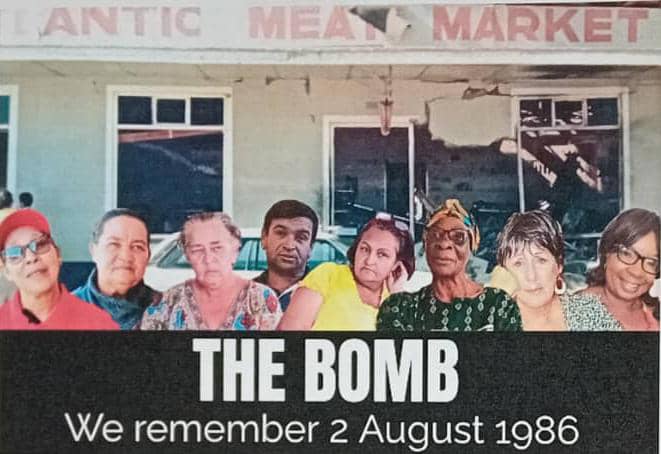In 1986 on 2 August, Walvis Bay residents got the shock of their lives when they had a blast coming from Atlantic Meat Market butchery.
A bomb that was planted in a bag of meat exploded in a butchery, killing four people and wounding 24.
The explosion demolished the shop.
It was reported that many people would have been killed if a meat delivery had not absorbed most of the blast.
Fast forward 38 years on, Taati Niilenge and Isidor Shilongo take Namibians back to this day through a production of the documentary titled ‘The Bomb – We Remember’.
Niilenge said the day will never be forgotten by many, and they want to show the world that it happened, as it impacted a lot of lives.
“We did not want to go into the politics of the matter, but really just to honour the lives that were lost, and remind the survivors that they are not forgotten. Some survivors have been pleading for years that something needs to be done to remember their loved ones. The documentary marks a moment of getting together remembering and comforting one another because years cannot really take away the void and pain,” she said.
The author added that during the filming, people had a chance to ask questions to the survivors, and hear more from those who were not in the documentary.
Residents had the freedom to share their experiences.
“This is an opportunity to share the pain that has been stuck in victims’ and witnesses’ hearts. We noticed that a lot of young people have no idea about this day, and were very surprised to hear about it. They will have their chance to learn more about it. We hope to donate the documentary to the Ministry of Education, Arts and Culture so that it can be screened as part of a history lesson annually on 2 August,” Niilenge said.
The two-man crew did not receive any funding when making the documentary, so they dug deeper into their pockets to make this possible.
It took about a month to interview people.
“I had the idea for quite some time, but I was very busy. By the time I decided on it, I already had everything mapped out. It took many nights to do the editing, especially since most of the interviewees speak Afrikaans. I spent a lot on subtitles,” she said.
She added that many young people and new residents were amazed to hear that such an incident happened in their town.
“Apart from the documentary, we would like for it to be used as a history project by learners, and to be screened for them every year on 2 August. We did not concentrate on the political part of the story, but merely on memories of the day, and how it has impacted family and friends. Survivors and witnesses shared their sides of the story.”
The documentary was shown at the Walvis Bay community church recently, and has garnered interest.
“It was a sad experience, and we realised that they harbour 38 years of serious pain. It was good to talk to them, and they were all so excited to finally share. We have interviewed people on and off camera. There are undisclosed details of how some were affected since that day.
“They still keep calling me, just to talk about what they are going through. People in the town know about the bomb, but some tragic aftermaths still require healing. The survivors are excited about the documentary,” she said.
-slunyangwe@nepc.com.na


